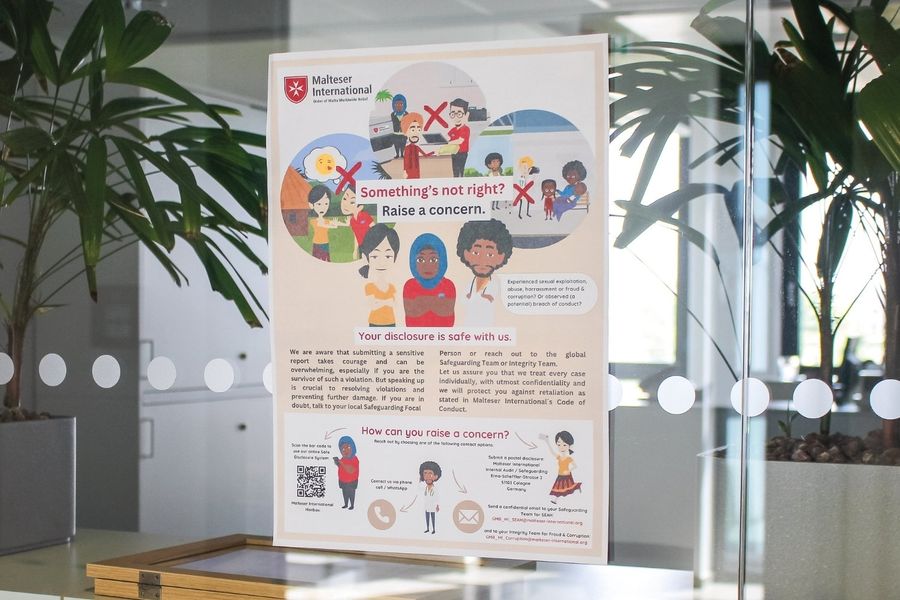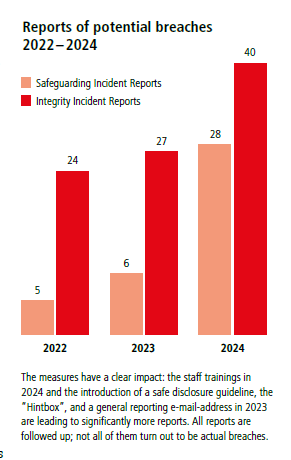Risk Mitigation at Malteser International
In some areas of humanitarian work, the risks of misconduct or security problems are particularly high. These can include fraud or corruption, sexual exploitation, abuse, and harassment, or risks to the safety of staff. Malteser International (MI) is actively committed to minimizing these risks.
What does it mean?
- Integrity Management – are measures for the protection against fraud and corruption.
- Safeguarding – means protection against sexual exploitation, abuse, and harassment (SEAH).
- Safety and Security – concerns operational security and protection against attacks.
MI does not tolerate any misconduct or unethical behavior by staff or contractually bound partners and service providers. In the areas of integrity management, safeguarding and safety and security, MI has developed guidelines and procedures to minimize risks and learn of possible misconduct. Systematic prevention and the “Hintbox” online portal for anonymous reporting introduced in 2023 are key elements of this. The team responds to all reports in accordance with the guidelines (zero-tolerance approach to non-acting in cases of a perceived integrity-breach). The guidelines and procedures also govern fair and proportionate responses to any misconduct in line with international standards.
Integrity management
At its core, integrity management is about reducing the risk of fraud and corruption by creating a work environment based on honesty, fairness, and respect. “MI’s integrity management includes internal audits, training, advisory services, and the review of reports and investigations when a report is suspicious,” says Gerhard Serafin, MI‘s internal auditor. The first aim of these activities is to prevent corruption. By raising the employees’ awareness of the tools and knowledge needed to fight corruption, as well as of the risks and reporting channels, the organization aims at increasing both deterrence and willingness to report.
Secondly, the integrity management team works actively to detect corruption, if it occurs despite all preventive measures. Investigations are implemented to identify both corrupt individuals and systemic gaps, such as weak controls. Internal audits and requests for advice also draw attention to integrity gaps. In 2024, 413 MI employees actively participated in a total of 14 prevention events. In collaboration with external experts, the dedicated MI team also produced “A Quick Guide to Workplace Investigations” as well as an accompanying video, which is available free of charge to other humanitarian organizations in our media library.
Safeguarding

MI is committed to maintaining an environment that effectively prevents the abuse of power and protects the people MI serves as well as MI employees from sexual exploitation, abuse, and harassment. To this end, the dedicated Safeguarding team has developed and rolled out a Complaint and Response Mechanism (CRM) that considers the needs of the communities, their feedback, and their complaints. Transparency, confidentiality, and personal contact are key: “If you don’t know the system, you don’t trust it. We respond to all allegations. Our focus is always on the survivors of violence, and we try to handle what can be very traumatic issues with the utmost sensitivity,” says Shane Fischer, Global Safeguarding Manager at MI. She and her team handle complaints and the associated investigations. They provide support for those affected in a survivor-centered way and follow a trauma-informed approach. The team also holds trainings to raise awareness among colleagues at headquarters, MI project sites, and for partner organizations. In total, the team has held 23 safeguarding trainings in 10 different locations worldwide in 2024.

Safety and Security
Humanitarian workers are often exposed to considerable risk. The insecurity and volatility of many of our operational locations are two of the main drivers of threats to our staff. At the same time, MI has a legal and moral duty of care towards its employees, compelling it to take all reasonable steps to ensure their physical and emotional well-being. “We do this through constant, systematic identification, analysis, and mitigation of risks through MI’s Safety Risk Management Framework. We provide tools, technical assistance, and practical guidance to country operations. This helps to establish and maintain a positive safety culture at all levels of the organization,” says Robert Urner, Global Safety and Security Advisor at MI. In 2024, the Safety and Security team introduced a system to rapidly assess and communicate the threat level in MI’s countries of operation. This helped both decision-makers and staff to better understand needs and minimum standards. In addition, an alarm and monitoring system linked to travel bookings was established for all business trips, and security training (HEAT) was standardized for all travellers to high-risk countries.
With these combined measures and their continuous development, MI has reached a high standard of operation that protects all people involved in MI’s work and thereby ensures the safe continuation of MI’s service for those in need.
“We invest a lot in training because we know that education is incredibly important. Studies show that when the work environment is educated, there is significantly less harassment.”
Shane Fischer, Global Safeguarding Managerin bei Malteser International (Foto: Malteser International)









